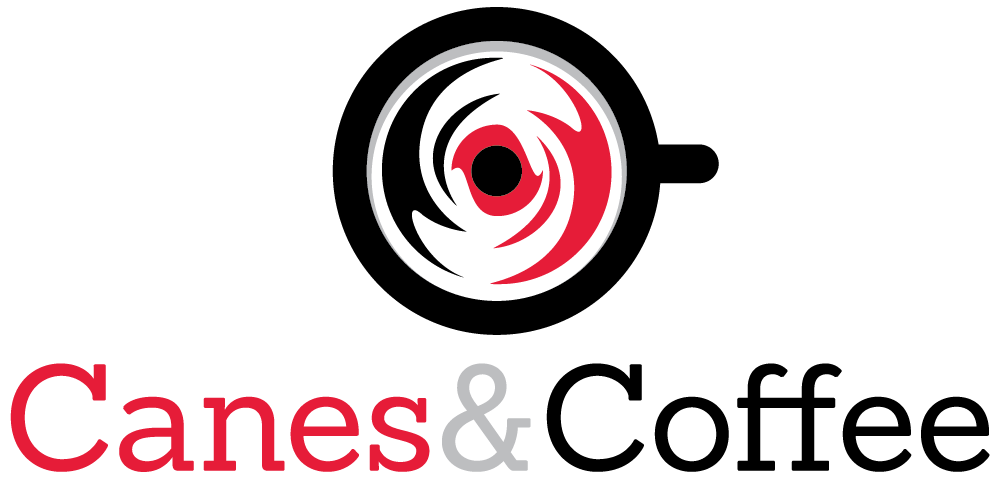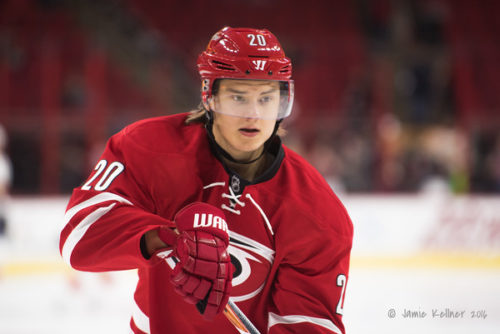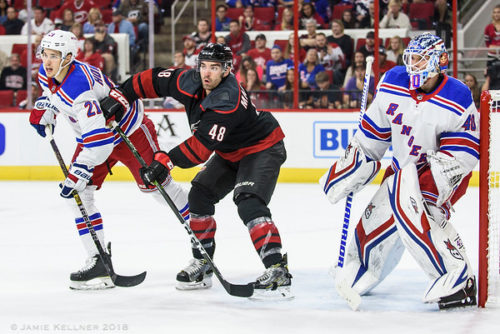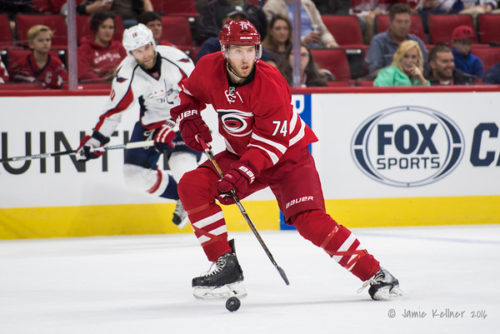Barely after the calendar flipped to 2017, I wrote a series of posts saying that the Hurricanes should step into the fray and considering making a deal for Matt Duchene. On January 2, I identified trade options including Matt Duchene. Then on January 4, I ventured out on a limb and put together a trade package for Duchene.
My historical bias against trading Justin Faulk even for a comparable quality forward
At the time and since then, I have consistently said, that I would consider trading a high-end set of futures including high draft picks and even the likes of Haydn Fleury or Roland McKeown. Thus far, I have been steadfast in saying that even though it might ultimately be what it takes, I would not consider including a young roster NHL defenseman (basically no on Justin Faulk, Jaccob Slavin, Brett Pesce and Noah Hanifin) in such a deal.
I have been consistent in that for some time for 2 reasons. First, I think legitimate top 4 defenseman are both harder to find and harder to do without than top 9 or even top 6 forwards. In addition, though the Hurricanes have a pipeline of young blue liners with high-end potential, as of right now, the Hurricanes have only 3 defenseman who have really even played in a top 4 role and are reasonably proven. (And importantly, I would have counted only Faulk as proven in that regard last summer. Things have changed but at the time, I was not ready to give Slavin and Pesce full credit based on a season or less in a top 4 role.)
On June 29, 2016 prior to Taylor Hall’s trade to New Jersey, I analyzed a potential Faulk for Hall trade, actually considered it a reasonably fair deal, but still voted ‘no’ because of my reasons above. On December 8, 2016 before the Matt Duchene thing blew up, I basically rewrote my Hall for Faulk post from the summer. While I did acknowledge that the situation had changed somewhat, I again voted ‘no’ on trading Faulk straight up or similar for a comparable forward in Duchene. But the key changes noted in that article were twofold. First, Slavin and Pesce had both taken another big step forward and solidified their ability to play top 4 (top 2 actually) roles at the NHL level. In addition, Faulk’s stock had dropped at least a little bit in my opinion because of his sub-par first half of the 2016-17 defensively. But even still I voted ‘no’ on trading Faulk for Duchene again for the reasons outlined above.
Revisiting Justin Faulk for Matt Duchene
With the February 28 trade deadline now just over 2 weeks away, the trade chatter is increasing significantly. Depending on who you read and which day of the week it is, the Hurricanes continue to be linked to the Colorado Avalanche. The variables are many. On the Colorado side, it could be Matt Duchene or Gabriel Landeskog. And the alleged asking price continues to be a young defenseman which theoretically pulls 4 Hurricanes players (Faulk, Hanifin, Slavin, Pesce) potentially into the equation. But more so lately the chatter has been a trade of comparable players in Justin Faulk and Matt Duchene.
It is that time of year, for the third time in about 8 months I will ponder the possibility of trading Faulk for a high-end forward, specifically Matt Duchene though similar arguments would apply to another high-end forward too. First there is a section that details why it might make sense to swap Faulk for Duchene, and then there is a section that details why it might be better to pass on such a deal.
Why it makes sense to trade Justin Faulk for Matt Duchene
1) It might be time to collect elite value for Faulk while it is still high
Faulk’s play during the 2016-17 season has been that of a good #5 defenseman who brings value as the offensive half of a bottom pairing. There. It hurt, but I said it. Thus far in 2016-17, I just do not think Faulk has played at even a top 4 level defensively. Again, offensively, he has had another strong season thus far. But being a legitimate top 4 also requires solid defensive play and the ability to line up against other teams’ scoring lines and hold your own. Faulk, playing primarily with Hainsey, just has not, especially on the road. Away from home where opposing coaches can dictate match ups and exploit weaknesses, they have done exactly that in playing their best scorers against Hainsey/Faulk and have been rewarded for it. Faulk is a minus 24 in 26 games on the road. Basically, the Hurricanes are getting their clock cleaned with him on the ice at even strength on the road. Faulk’s potential ceiling is much higher, but if his current level of play is indicative of the future, getting top 4 value for him in trade would represent a very good return.
2) The team is in a better place in terms of being able to fill the top 4
Last summer when the Taylor Hall deal was being bandied around, Faulk and Hainsey were the Hurricanes only top 4 defenseman with more than a single season of NHL experience and because of his age Hainsey was considered to be a short-timer in that role. Sure, there are multiple options for the future, but who was going to play in the top 4 and give the Hurricanes some chance of winning for the 2016-17 season? Now in their second NHL seasons, I think it is fair to add Jaccob Slavin and Brett Pesce to the mix. Obviously, that still leaves 2 top 4 defenseman positions to be filled, but that is down from 3 positions last summer.
3) Could timing make it possible to upgrade the offense and then back fill Faulk’s slot with another good defenseman?
Here is an interesting wild card. Could it be possible to trade Faulk to add a top-end forward like Duchene and then turn around and trade futures to back fill Faulk’s slot with a good, possibly even young, defenseman? The standard protection list for the upcoming expansion draft allows teams to protect only 3 defensemen. The only way around this is to protect 4 defensemen but to protect 2 fewer forwards in exchange. That might work for some teams but is not a viable solution for teams that are also deep at forward. The result is that there could be a handful of pretty good defensemen available via trade some of which might be available for a package of futures depending on what the trading team wants. In addition, salary cap situations could free up a few more short-term, veteran options for the top 4 at a reasonable cost.
4) Financially the deal works
A swap of Faulk for Duchene is reasonably even financially, though Faulk does have an additional year on his current contract. Duchene costs $500,000 more in both 2017-18 and 2018-19 ($6 million then $6.5 million). Faulk is $500,000 less in each year and is also signed for 2019-20 for $6 million. The upshot is that the deal would basically add a top forward and subtract a top defenseman without much impact to the team’s financials for the next 2 years. With a couple players coming off contract (Bickell at $4.5 million, Hainsey at $2.5 million and a couple lesser salaries), Francis could have some money to add another veteran defenseman to help build a bridge to the youth that is on the way.
Why it does NOT make sense to trade Justin Faulk for Matt Duchene
1) There are reasons to believe that Faulk will rebound and play at a higher level going forward
First, it is important to note that his offensive ability has significant value and remains intact. The scoring part of the Hurricanes’ young blue liners’ games is still very much a work in process giving Faulk extra value in terms of building a balanced lineup. In addition, there is reason to think that the defensive part of Faulk’s game will rebound. He did play at a top 4 (top 2 even) level with Andrej Sekera at a much younger age, so it is not as if Faulk is a player who has never reached a higher level and is being counted on to improve. It is simply a matter of getting back to where he once was. There could also be situational elements in play. At 35 years old, I think Hainsey has stretched past his days in a top 4 role. With a different stay-home partner at his side, might Faulk rebound significantly in 2017-18? In addition, I have to wonder if injuries could be part of it. Per #2 in the ‘does make sense’ section above, part of me wonders if injuries have played a factor in his mobility. Faulk’s nagging/recurring leg injury last winter was both a setback for the season but also possibly for his summer training. I was surprised to hear at the town hall discussion with Bill Peters in July that Faulk was healed. The news was not bad, but the impression that the injury dragged significantly past the end of the season was a surprise. In rough terms, Faulk was limited for most of the last 2+ months of the hockey season and then roughly 2 more after it ended. On top of that, he suffered another leg injury during the season. It is not clear if that was similar to last year’s injury, but regardless, it was another injury that could theoretically have had a lasting impact on Faulk’s mobility. So in addition to the situational factor in terms of his partner, perhaps a regular summer of preparation could provide a reset and a rebound for the 2017-18 season.
2) The system depth just is not ready yet
Saying that the Hurricanes have the potential to build a solid top 4 from within is not the same as saying that they are ready to do it for the start of the 2017-18 season. If Faulk is traded away and if you assume that Hainsey will either depart or fill a lesser role, that leaves an entire second pairing to be filled. Noah Hanifin figures to play in such a role some day, but as of right now, he has not proven ready for more responsibility than his current bottom pairing role. Roland McKeown and Haydn Fleury had strong training camps and look promising, but neither has even played a regular season NHL game yet. Trading Faulk would either require the Hurricanes to have young players step into a trial by fire situation in the top 4 which sounds like still rebuilding. The alternative of trying to back fill the hole by adding a proven top 4 defenseman or 2 via trade or free agency could be both challenging and expensive.
3) The blue line seems really risky for the remainder of 2016-17 and also 2017-18 minus Faulk
Sort of in the same vein as #2, the prospect of building a capable top 4 for the start of the 2017-18 season just looks really dicey. Sure there is the potential that 1 or more of Hanifin, Fleury or McKeown just parachutes into the top 4 like Slavin and Pesce did, but that feels more like wishing than planning. And sure there is the possibility that Francis leverages the expansion draft situation and adds short-term help to build a bridge to the youth, but as a general rule there are more teams shopping for top 4 help than there are players available.
The evaluation points for Ron Francis
When I sort through all of the details, I think it comes down to 2 things for Ron Francis:
1) What are reasonable expectations for Justin Faulk going forward? Is the 2016-17 version of Faulk also the future? Or with a different partner or a full summer to reset, can he find a higher gear defensively? How that question is answered sets a wide range of possible uses and values for Justin Faulk.
2) How would the Hurricanes build out their top 4 on defense short-term (2016-17 and 2017-18) minus Faulk? The prospects of bumping up Hanifin and then adding Fleury, McKeown or a depth defenseman could work if Pesce/Slavin magic strikes again, but it is incredibly risky. Might Francis’ phone calls also be exploring options to back fill the hole with short-term, veteran help?
Up until now, Francis’ work has primarily been to basically sell everything possible at the trade deadline and add as many futures as possible to stock the depleted system that he inherited. But with the depth and the team improving and much of the roster populated with young players, we are quickly reaching the stage of the game where Francis must make some make or break decisions to fill a few roster holes and push the team over the hump.
Personally, I am torn. I still consider top 4 defensemen to be more valuable than forwards. But I am also on record as not being thrilled with Faulk’s defensive play. If it were 2 weeks or maybe even a month, I would not be too concerned, but the season is two-thirds complete, and I still looking for a higher gear that has not really appeared for more than a few games here and there and almost exclusively on home ice where Peters can pull levers to get match ups that work.
Also check out the Monday Coffee Shop which is open for business with polls and discussion questions on the Faulk/Duchene situation detailed above plus more.
Go Canes!




Well, there they are. The pros and cons of a trade of this magnitude. IMOP, you make the trade if it improves the overall skill level of the team. Does Duchesne rank higher than Faulk in skill and ability to provide production at a more consistent rate than Faulk? I would say yes. A top 3 forward tops a 4-5 defenseman (at best). I would rank Slavin as the only player on defense that is untouchable. Again, to get good talent you’re going to have to trade talent and it will be painful. in this case talent plus youngsters. It will likely take Faulk and Bean or Fleury – at a minimum – to get Duchesne. It could be Hanifan, Fleury or Bean and another forward an/or high draft pick. I don’t believe any trade will go down before the end of the season if it involves Carolina but if it does, it sure will make things much more interesting down the stretch.
Let’s look at the statistics first. Duchene 15 goals, 17 assists, Minus 18 and gets maximum power play time. Landeskog 11 goals, 11 assists, Minus 17 and he gets maximum power play time. WE ARE SUPPOSED TO TRADE A DEFENSEMAN (FAULK) 11 GOALS, 14 ASSISTS, MINUS 16 FOR EITHER OF THESEE PLAYERS? The only way you make such a trade is if you think the defenseman can’t handle top 4 time on the ice. I’m not ready to say that about Faulk. If Colorado wants to take a couple of potential defensemen like Fleury and/or Mckown, then let’s talk turkey. Otherwise let’s call it a day on this one.
Note: No matter what RF and BP do I am going to be good with it as I am aware they know at least a little more about things like this than I. At least that is the rumor I hear every day from my other hockey friends. You might be better off listening to “tenininumee” above. In all I read he or she seems to make good sense.
Tough argue that RF and BP know more about hockey than someone who has only played pond hockey and watched a lot of games as a fan of the sport. I’m with you, I don’t necessarily like to pan coaches or general managers in any sport. I tend to give them the benefit of the doubt, especially when it appears that there actually is a plan in place and decisions aren’t made on the fly based on emotions or fans expectations. Sometimes it feels as if Francis is moving as quickly as a herd of turtles, but there is a method to his madness. At least I hope so. Regarding the prospective trade, I’d throw out both player’s statistics for this season. It has been an epic cluster**** in Denver and tough on anyone to be successful given the dysfunctional management of what had been a decent team. Even advanced metrics can be deceptive. Teams play different styles and systems and players on one team may be slotted differently on another (resulting in different roles and responsibilities). I have no clue what the best move is. But I stayed in a Holiday Inn Express last night so……